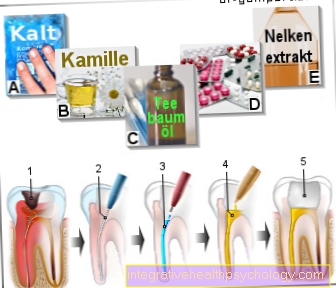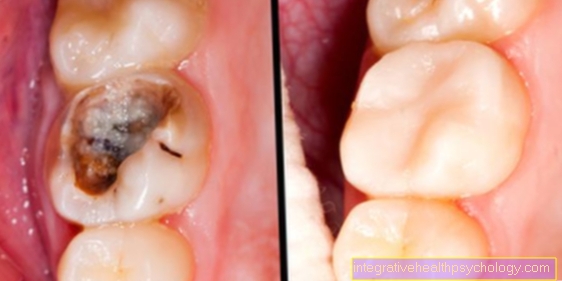Blopress®
Active ingredient
Candesartan
Effect of Blopress®
Blopress® contains the active ingredient candesartan and is a drug that is used primarily in the treatment of high blood pressure (Antihypertensive agent) Applies. Candesartan belongs to the group of angiotensin II receptor antagonists, i.e. it blocks a receptor and thus inhibits the effects of the hormone angiotensin.
Blopress® thus leads, among other things, to an expansion of the blood vessels (vasodilation) and a reduced retention of sodium and water in the body. Angiotensin II receptor antagonists are similar in their spectrum of action to ACE inhibitors, but they have a slightly different side effect profile.
Application / indication
The main indication for Blopress® / Candesartan is arterial hypertension. In patients with an intolerance to ACE inhibitors, Blopress® is also used as a basic therapy for heart failure.

Side effects of Blopress®
With the so-called "Sartans“Can - especially with pre-existing functional restrictions of the kidney - an increase in the Potassium level in blood (Hyperkalemia) occur. Such hyperkalemia can cause among other things Cardiac arrhythmias Therefore, the blood values must be monitored closely, especially at the start of therapy. Other common side effects of sartans are dizziness, a headache, Impaired kidney function and Respiratory infections.
Rare side effects of Blopress® are skin rash and itching (Pruritus), swelling from face, tongue and Lips (Angioedema), Muscle aches (Myalgias), nausea and increased Infectious tendency by a decrease in the number of white blood cells (Leukopenia). In contrast to the ACE inhibitors occurs cough clearly under therapy with sartans less common on.
This is the most common reason for switching therapy from ACE inhibitors to sartans.
Interactions
A combination of Blopress® with other drugs against high blood pressure (Antihypertensive drugs), for example Beta blockers or ACE inhibitors should be dosed carefully because of the risk of excess Lowering blood pressure. A combination of Blopress® with potassium-saving Diuretics is contraindicated. A combination of Sartans With Painkillers from the group of non-steroidal anti-inflammatory drugs (NSAD / NSAIDs), for example Ibuprofen or Diclofenac, the blood pressure lowering effect of candesartan may be weakened. When taking lithium (mainly used in the treatment of mental illnesses) its excretion can be reduced and thus the effect increased. This is dangerous with lithium in particular, as even a slight increase in the blood level toxic can have a (toxic) effect.
Contraindications
Angiotensin II receptor antagonists should not be used with other so-called "Potassium-sparing diuretics“, So water tablets such as Amiloride, Triamteren and Spironolactone be combined, as this increases the risk of high potassium levels (Hyperkalemia) still increases significantly.
Further contraindications are bilateral Narrowing of the kidney vessels (Renal artery stenosis), severe Kidney or liver impairment such as pregnancy (especially the last six months) and Lactation.
If pregnancy is diagnosed during therapy with candesartan, therapy should be stopped immediately and replaced with another.
dosage
In patients with arterial hypertension, the starting dose should be Blopress® 8 mg once a day be. This is usually the dose for long-term therapy (Maintenance dose). If there is no response, the dose can be increased 16 mg and a maximum of 32 mg daily can be increased. In patients with Heart failure should be with a dose of 4 mg once a day to be started. A fortnightly increase up to 32 mg daily is possible.
costs
A private prescription costs 56 tablets Blopress® 4 mg about 39 euros. 56 tablets with a dosage of 8 mg cost around 49 euros, 16 mg around 57 euros and 32 mg around 70 euros. With a prescription, 56 tablets cost Blopress® with a dosage of 4 and 8 mg only the prescription fee, for 16 and 32 mg up to 2 euros are added to the prescription fee.
Note: lowering blood pressure
It is therefore very important that the patient informs the attending physician of all medications that he takes regularly. This is because a sharp drop in blood pressure can occur if several drugs with antihypertensive effects are taken that are not coordinated with one another. Drugs that lower blood pressure include Beta-lockers, diuretics, sedatives, antidepressants, and alcohol.

















.jpg)











